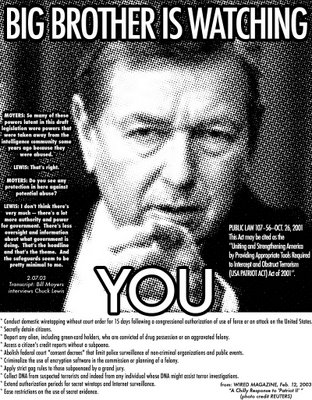Big Brother 1984 Double Plus Good
OTTAWA - Federal government departments are profiling some access requesters, a veteran Ottawa researcher charged Monday.
Testifying before a parliamentary committee, Ken Rubin revealed that he learned recently he has been the subject of just such a profile.
Documents Rubin obtained from the Canadian Border Services Agency revealed a memo prepared in January 2004 for then-public safety minister Anne McLellan outlining an access request that Rubin had filed for information concerning the department's Advance Passenger Information project. In the memo, which the department told Rubin was never transmitted all the way to the minister, the department outlines details of telephone calls officials had with Rubin, other access requests he had filed and the fact that he had volunteered to help Maher Arar and his wife get information about their case.
At the time, Arar was still under suspicion by the government of being a terrorist and was on a watch list along with his wife and children.
The memo was released to Rubin earlier this month under the Access to Information Act after he filed a complaint.
''This is unacceptable,'' Rubin told the committee. ''Matching up my background data and work and separate access requests should not be used to create a profile and discuss my access usage or that of other requesters. I do not consider this kind of data being prepared and shared internally or going, or potentially going, to a minister, a positive part of, or within the spirit of the Access to Information Act.''
New Democrat MP Pat Martin said he was shocked to learn that a government department had prepared a profile of an access requester.
''I think it is an absolute bombshell that they are not only asking the identity, which I think undermines the integrity of the whole system, but they are asking about confidential personal information.''
Jason Kenney, parliamentary secretary to Prime Minister Stephen Harper, said Rubin's testimony about being profiled corresponds with some of the testimony that the committee has already heard about the way the privacy of some access requesters has been treated in the past.
''This would be, I guess, the third concrete instance that we know about. There seems to be sufficient evidence to conclude that this practice of furnishing names to political staff has happened in the past. Just how widespread or how frequent, we just don't know.''
The comment came as the committee wrapped up another day of hearings into reports that the government appears to have broken the privacy law by disclosing the name of Canadian Press reporter Jim Bronskill during a telephone conference call in which public servants from several departments discussed which reporters were working on stories related to security and to pandemic preparedness.
The information was then sent to several officials in the prime minister's office who had not participated in the call, including communications director Sandra Buckler. None of those officials reported a possible violation of the privacy act.
Privacy Commissioner Jennifer Stoddart is investigating.
Kenney could not say Monday whether the government has reviewed the minutes of the weekly security conference call to ascertain whether there were other instances of the names of access requesters being discussed.


